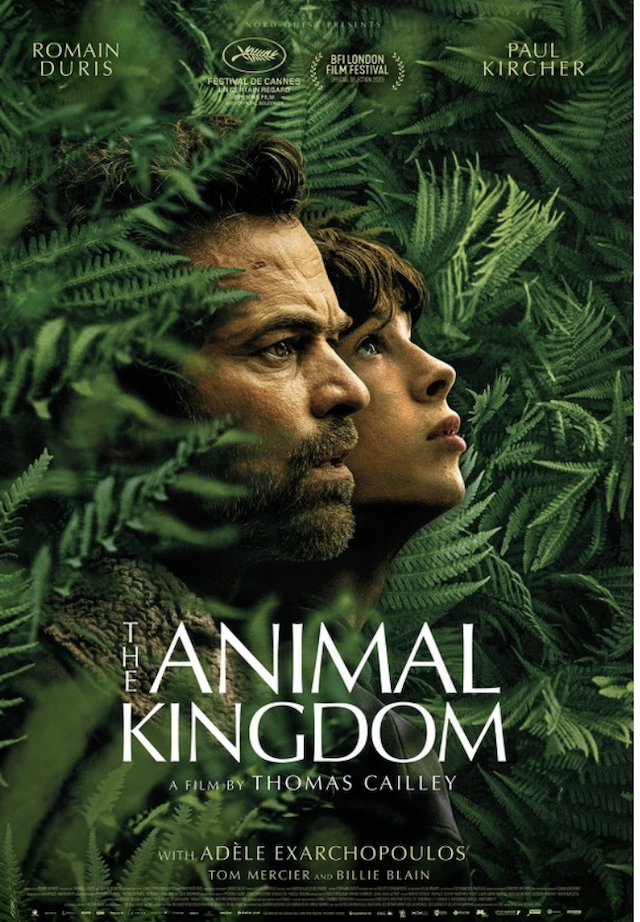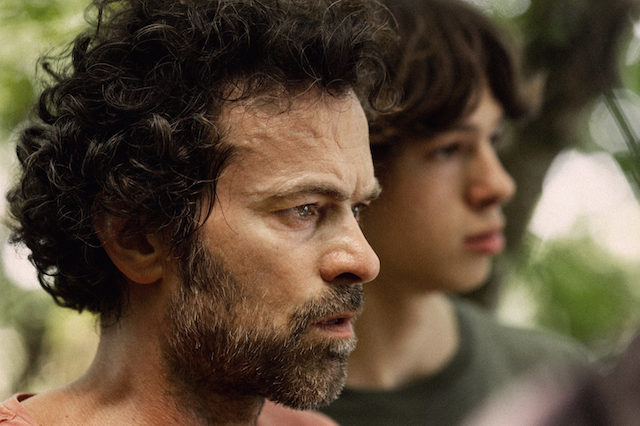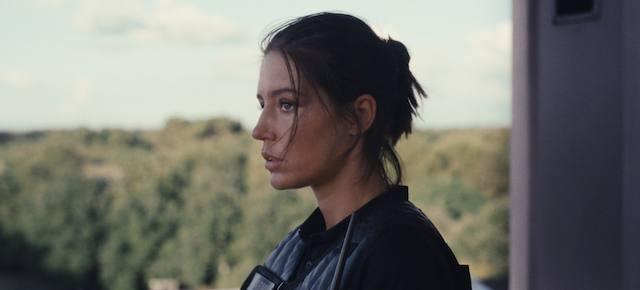
©STUDIOCANAL INTERNATIONAL
Losing your teenage son to adulthood can be tricky enough for some parents. But to see him turning into an animal would surely be a tough one. Well, that is what the father in Thomas Cailley’s “The Animal Kingdom” must cope with in a world where humans are transformed into hybrid animals. The French box office hit and 12-time César nominee, that opens Lincoln Centers “Rendez-Vous with French Cinema” in New York, is an ambitious genre mash-up dystopia with family tensions.
We first meet the family in question, François (Romain Duris “The Beat That My Heart Skipped”, 2005) and his 16-year-old son Émile (Paul Kircher “Winter Boy”, 2022) being trapped in a traffic jam in Paris attempting to visit the wife/mother Lana, who has been in a long-term care at the hospital. Quickly we learn that something is not right in the world they live in – we are in a distant future. From the door of a nearby ambulance, a strange half man/half bird creature (“Synonyms” Tom Mercier) breaks out and causes drama, but doesn’t really surprise anyone, at least not François and Émile. It turns out that Lana was one of the first victims of an odd, new pandemic and is slowly turning into a wild bear. François still believes that her mutation can be reversed, but the more she changes into the creature, the less human she becomes.
This mysterious malady is slow and unpredictable for the unlucky; the more the hair grows on the back, or the feathers appear on the arm, the more they lose the sense of being and memories of who they once were. Lizards, bird, wolf, spider – they’d eat and act what the new form demands of them, fleeing into the forest where they can hide from the humans. At least in Yorgos Lanthimos “The Lobster” (2015), Colin Farrell’s character could choose which animal he would turn into, if he failed to find a partner in the hotel/facility. It’s random in “The Animal Kingdom”.

©STUDIOCANAL INTERNATIONAL
François decides to relocate to a small French southern town where his wife is being reassigned to a government containment facility. He takes a temporary job as a cook, and Émile follows along, although frustrated, and begins in a new school. Their dog, similar to the one in “Anatomy of a Fall”, becomes a healing force. Soon, Lana and many hybrids disappear in the forest after a transport vehicle accident and François hopes to find his wife on his own. This search is the thread of the film, and their relationship is one of many metaphors – it seems to represent divorce, illness, or numb love. François claims: “I’m scared of losing her and I’m scared of finding her”.
He does find comfort in a local cop, Julia, who tries to help him. She is played by the great Adèle Exarchopoulos (“Blue is the Warmest Colour”, 2013) whose talent is rather wasted in the small role. Romain Duris as François, though, is perfectly cast as the concerned father, while Paul Kircher as Émile, who made an impression in Christophe Honoré’s “Winter Boy”, beautifully manages to conceive the dubious teenage feelings – very different feelings as his claws begin to grow underneath his nails and his fangs becomes embarrassingly long. He knows his fate will be similar to his mother’s – Émile is slowly turning into a wolf. In his new school he befriends Nina (Billie Blain), a student with ADHD, while juggling to hide his body changes and feelings of attraction. He soon escapes to the forest where he has already come close to the birdman Fix from the traffic jam.
Although the film mixes sci-fi with the supernatural and adventure, the core is a coming-of-age and a father-and-son tale – it doesn’t really dive into frightening territories and the creatures are created with minimal special effects. The filmmaker Thomas Cailley, who previously directed “Love at First Fight” (2014) and the dystopian limited series “Ad Vitam”, (2018) co-wrote the script with Pauline Munier and was inspired by Clint Eastwood’s “A Perfect World” (1993), Yasujirō Ozu’s “The Only Son” (1936), and Bong Joon Ho’s “The Host” (2006). Obviously interested in shapeshifting mythology, he manages to balance all the metaphors and genres. That he is able to pull it off relatively well is an achievement – the film is a crowd-pleaser. The second half of the film uses lustrous and stunning cinematography, by the director’s brother David Cailley, to create a suggestive atmosphere.
The metaphors about exclusion, xenophobia, social panic, and the human relationship with nature (the humans just want to get rid of the hybrids), are, although well intended, overly clear in the final part. We have already understood the messages throughout the film. In Norway, according to François, they are better at living together. The wolf and the shepherd cohabit. It’s not about hunting or being hunted. Not about dividing. It’s about coexisting. Respect nature!

©STUDIOCANAL INTERNATIONAL
Grade: B
Check out more of Niclas’ articles.
Here’s the trailer of the film.

